#elusi
Text
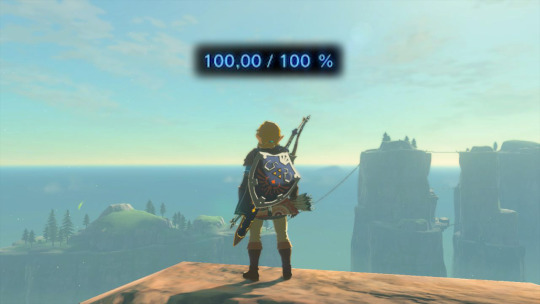
But... What am I supposed to do with my life now?
#the hyrule compendium is complete as well#the battery is full#all 135 pieces of armor were found and upgraded#(except the classic link outfits because come on)#...what day is it?#the legend of zelda#tears of the kingdom#zelda tears of the kingdom#again it was great and I’m waiting for the DLC because I guess it’s coming#also kass needs to come back#my map was already more than 97% complete but a lot of mines in the depths were missing#on the surface it turns out I had yet to visit three locations in the castle and 4 cave entrances#because each entrance counts as a location even if you’ve already found the bubbulfrog#that’s a funny name by the way#in french they’re called elusis#and since I mentioned kass his french name is asarim#it took me several months to realize it was a pun#asarim is pronounced like 'ah ça rime' which means 'ah that rhymes' haha
10 notes
·
View notes
Text
I have been sitting in my car for almost 10 days, but now I am ready, I am here.
THIS IS BOSTON!
What can I say? I am in love with this character. I have all my Boston eggs safely resting in my Boston Basket™ and I am here to chew your ears off about how I was right. Muhahahaha!
But seriously, Boston is finally understanding the importance of having a Nick in your life.
As I have already established in my previous manic Boston posts, Boston needs acceptance. Boston is a child in desperate need of boundaries. Furthermore, he needs to know that he will not be abandoned when crossing or pushing those boundaries. He is not getting that from his father, so he goes out looking for it outside.
This leads him to testing every boundary set by everyone he considers important. See, the more someone is of significance in our lives, the more we wish to test the boundaries of our relationship with them. We expect consequences, but we push because we know it is safe. We know we will not be banished for pushing a boundary, because we assume the love and trust we have with that person is unconditional. Those relationships are the spaces that allow us to grow and discover ourselves.
Boston is trying so hard, but he's stuck in a loop. He keeps pushing and hurting, but all he is getting from his friends is a push back. They are rolling the pain back onto him. Boston however, doesn't want the pain, he wants the acceptance. So, he disconnects to avoid the pain, and attacks back creating more pain and so on. He keeps doing the same thing and expecting a different result from his friends, but they are so far up their own asses (as 22 year olds usually are) that they don't have the emotional capacity to contain and understand him (also, objectively being a shitty friend is a bit of an issue here).
AND THEN CAME NICK
Oh my gawd that man is an angel. Nick is a genius and I will not be surprised to find out he is gifted.
He knows Boston so well, and he has been controlling him since their first interaction at the store. Nick understands how Boston works. He keeps giving him tiny rewards.
Nick first starts building trust by revealing embarrassing info about himself (the haircut/makeover story in the darkroom). Nick constantly keeps Boston on his toes by going left when Boston expects him to go right. Boston expects Nick to always want more than he is willing to give, but Nick keeps giving him an out.
Nick wants Boston to realize that having a relationship with Nick is what HE wants, and believe me he does.
Since the beginning, Boston has been coming back to Nick over and over again because Nick is giving him what he truly needs - acceptance.
Nick keeps confronting Boston with his BS but he never accuses. He's there to provide Boston with a mirror and say "look, this is who you are. Yes you have done some nasty things, but that's life." And that's where he stops. There is no hurt thrown back at Boston by Nick, because Nick is able to contain that pain.
Nick breaks the loop Boston is stuck in by choosing to react differently. Their final conversation this ep was the perfect example.
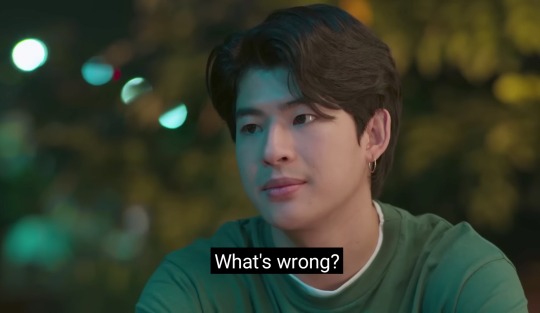
Nick asks a simple question taking genuine interest in Boston. However Boston, still deep in the loop processing his friends' reaction, snaps back.
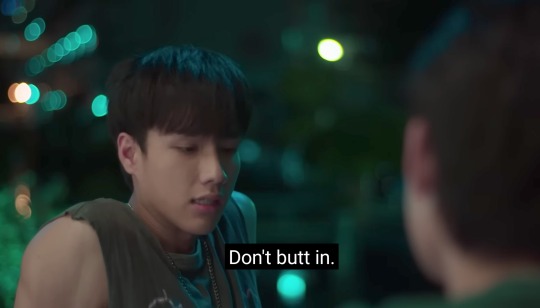
At this point (Mark comes through with the face journey) it is so clearly shown as Nick absorbs the impact of Boston's attack, takes a deep breath, processes, and responds not with an attack or rejection but with understanding.




Only then does Boston feel safe to open up because he knows he will not be rejected or judged.


Nick is able to see that whatever shit Boston has done is only about Boston, not anyone else. Which is why he is able to do what all the others are unable to - step the fuck aside and realize this is not about them.
This is where Boston finally breaks. Nick has proven over and over again that he is there for him. He loves him unconditionally through all the BS. That's why he feels the need to say this:

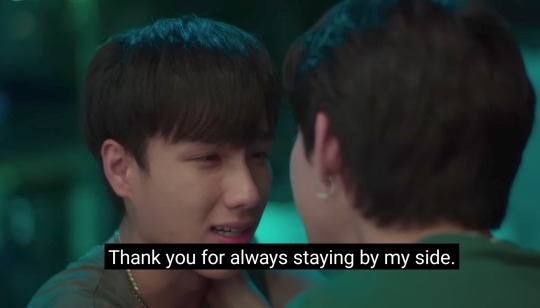
That elusive "thing" that Boston was going back to over and over again? That "thing" that he was getting from Nick and not anyone else? That's unconditional love and acceptance.
Finally, to end this I just want to say one more thing people - if there's one thing to be gained from this show, it's the realization that we need more grace in our lives. So when someone's being a piece of shit, just step the fuck aside and understand that it's not about you. And then, if you have the capacity, ask them what they need to feel better about whatever it is that's going on in their life.
As always, thank you for visiting my tiny soapbox. And a special thank you to @plantsarepeopletoo and @rocketturtle4 for everything really 💜💜💜
50 notes
·
View notes
Text
"Meglio non fare post divisivi."
Questa frase riassume il male della nostra epoca: la paura del giudizio altrui, il terrore di offendere o finire offesi.
La politica da quattro soldi che sta portando la nostra nazione al disastro questo giochetto lo ha capito benissimo e lo usa a suo vantaggio. I temi "divisivi" vengono accarezzati, circumnavigati, elusi per evitare di incorrere nell'ira di una parte del pubblico. Si tenta di accontentare tutti per suscitare un applauso corale, dando un colpo al cerchio e l'altro alla botte.
Risultato? La morte della politica, che si riduce a una ricerca spasmodica e incoerente del consenso, sulle ali dei sondaggi e dei "trend" del momento, mentre le grandi tematiche sono lasciate al pilota automatico.
Volete questo? Da noi di Pro Italia non lo avrete mai. Noi ci schieriamo, dai temi di respiro internazionale a quelli di caratura locale. Qualcuno non sarà d'accordo con alcune prese di posizione? Bene, costui può scegliere tra due strade: entrare nel vivo del dibattito portando le proprie tesi, magari provando a dimostrarne la validità, oppure reagire come un bambino con un bel "NoN vi SeKuo PiùH!1!".
In entrambi i casi per noi è una vittoria, perché siamo un partito in crescita e cerchiamo militanti, non solo sostenitori, che abbiano il coraggio di scontrarsi. La società dell'assenza di rischio, fisico e verbale, la conosciamo già. E ci fa orrore.
Matteo Brandi
Pro Italia - Segreteria Nazionale
👉 Segui PRO ITALIA
Telegram | X | Facebook | Instagram | YouTube | Sito ufficiale
3 notes
·
View notes
Text
LTB Worldbuilding Wednesdays: The Theocracy of Salusceia
A weekly series in which two of my BG3 Tavs describe the original homebrew 5e world they live in.

Cannor’s Guide
“The Havenleague isn’t so much a society as a loosely-connected populace of fearful, raving hypocrites masquerading as a society. Not all of them, but certainly anyone who’s in charge of anything. They could all benefit from removing whatever got stuck up their holes during and after the Downfall. Maybe they’ve all got volcanic embers in there. Salusi priests seem to relish burning away anyone who dares to think differently. They loudly proclaim their freedom and boast of their god’s hatred of slavery, but from what I’ve seen, the indentured peasants on those vast estates might as well be enslaved. It’s a controlled, oppressive society. They criminalize magic, and they distrust music, drama and even sports. I think they hate fun. It’s a baffling place.”
“Salusi believe they’re Aurigans come again, which they are by language, and mostly by looks as well, but oh so much less. Imagine beautiful people made ugly and aged by fear and hate. Pinched, judgmental faces and terrified piety wrapped up in a dubious sense of mission as some essential balance against the allegedly evil Vati barbarians from Zeyira. The Vati loom large in Havenleaguers’ minds, to the point where they erupt from crazy priests’ sermons more resembling monsters than the civilized, refined people they are. I’ll bet the Voice of the Lord is just itching to sicc his inquisitors on the whole of heretical Koprua, but we’ll never know unless ol’ Erracho feels his britches are too big for Emberhaven and decides to ‘do something about those heathens.’”
“What’s so maddening is that it’s not difficult to praise the best of what’s on offer here. The harbor at Cenefuegira is first-class, and the taverns there pull better pints than almost anywhere in the East. I could marvel all day at the light bending through the Cathedral’s stained-glass, or the master woodwork from Selvacineira, or relish a bite of trout from the Santi River. I’ve not yet been to the Stone Hill on Colinetreia, nor seen the Island of Doubt’s ancient relics, but I’m told they’re wondrous. Salusceia is actually a beautiful place, as long as you bleat piously and don’t have any fun at all. Zealously perverting old creeds for the sake of cultural survival is no way to run a country.”
Ruy’s Reckoning
“Salusceia was the first foreign territory the Aurigans added to their Golden Empire, and a few decades after the Downfall it transformed from the refugee-choked province of Anaxia to one of the most prosperous and powerful Golden States. The Havenleague is both alike and different from its fellow refugee-founded main trading partner, Griseia. Salusi society is religiously regimented, based on their Heavenly God’s Law, but instead of isolationism, the Salusi state’s insecurities manifest as xenophobic aggression, mostly against the Vati Empire on their southwestern border. Salusceia also draws comparisons to Nevela; both entities claim to preserve and exemplify the best of Aurigan culture, but both have effectively become unique societies. Like Nevela, Salusceia’s pleasant countryside produces abundant sustenance and exports; Salusi textiles are renowned throughout Avorea, and Cenefuegira is the most populous capital in known continental Avorea.”
Main settlements: Cenefuegira (Emberhaven; large capital city), Santistrima (Sanctumstream; small city), Balamonte (Bellmont; town), Selvacineira (Nearwildhaven; town), Colinetreia (Stone Hill; town). Fortresses: Osservare (Westguard), Lacuscela (Heavenlake), Santesta (Holyhead), Vettacuta (Summitsharp), Santisena (Sanctumsound), Paganacusti (Paganguard), Pontecusti (Bridgeguard), Morandesar (Saltgrave). Ruler: Erracho III, the Voice of the Lord. Languages: Auransi, Elusi. Economy: Closed mercantile, producing linens, sugar, wheat, and woolens; trading (mostly with Griseia) for iron, copper, silver; trading with Easterners for spices and steel.
All text and imagery taken from "The Nua Gazetteer, Volume 1" by Keir DuBois (2022).
#ltb worldbuilding wednesdays#worldbuilding#5e worldbuilding#ttrpg maps#fantasy maps#fantasy worldbuilding#nua golden states
2 notes
·
View notes
Photo

* * * *
Problem. Mystery.
via “Alive on all Channels”
“Scientific rationalism consists largely of problem solving, an approach that does lead to systematic advance: after a problem has been solved, it can be laid aside and scientists can move on to tackle the next. But the humanities do not function in this way, because the problems they confront, such as mortality , grief, evil, or the nature of happiness, are not capable of a once-and-for-all solution. It can take a lifetime’s engagement with a poem before it reveals its full depth. This type of contemplation may function differently from ratiocination, but it is not for that reason irrational; it is like the "thinking” Heidegger prescribed: repetitive, incremental, and receptive. The French philosopher Gabriel Marcel (1889-1973) distinguished between a problem, “something met which bars my passage” and “is before me in its entirety,” and a mystery, “something in which I find myself caught up, and whose essence is not before me in its entirety.”
We have to remove a problem before we can proceed, but we are compelled to participate in a mystery – rather as the Greeks flung themselves into the rites of Elusis and grappled with their mortality. “A mystery is something in which I am myself involved,” Marcel continued, “and it can therefore only be thought of as a sphere where the distinction between what is in me and what is before me loses its meaning and its essential validity.” It is always possible– and perhaps a modern temptation– to turn a mystery into a problem and try to solve it by applying the appropriate technique. It is significant that today a detective story based on such problem solving is popularly known as a “mystery.” But for Marcel this is a “fundamentally vicious proceeding” that could be symptomatic of a “corruption of the intelligence.”
–“The Case For God” by Karen Armstrong
10 notes
·
View notes
Text
spartanrenegade on AO3 asked an intriguing question regarding the events in chapter 13 of The Breaking. To paraphrase:
What if Kyra's arrow actually killed Deimos during her demonstration of loyalty? What would Kyra do then?
It's an AU of my AU! And after I got done cackling over the mental image of Deimos being brought to such an abrupt end, I started giving it some thought.
What follows is a rough narrative summary of how this story would go if Kyra killed Deimos right then and there. (Writing a narrative summary, aka narrative outline or plot treatment, lets you sketch out ideas without fully committing to them. It's also helpful when you're stuck in a narrative and need to explore ways to get un-stuck!)
~~
Deimos is dead. The reality of it takes a while to set in, shock giving way to a creeping sense of elation. "Some god you turned out to be." Deimos is dead, but Kyra doesn't want to stick around for the aftermath. Rejoicing can wait.
Kyra relieves dearly departed Deimos of her coin purse and belt-knife, gathers the bow and the quivers of arrows, and returns to Epiphron. Kyra knows little of this part of Attika, but she knows which way is Athens, and once her gear is secured to Epiphron's saddle, she rides away from the city, further into the hills.
She spends the next several days hidden high among the scrub oaks, hunting for food, a huntress in her element. Far below, she can see a major road, and she spends plenty of time watching squads of soldiers come and go. Deimos's disappearance has been noticed.
Kyra herself notices a number of travel-worn pilgrims journeying on the road. There's a sanctuary nearby, and that gives her a course of action. She continues following the road from above, and when she comes across an estate with a farm and olive grove, she trades Epiphron and her cloak for drachmae and a new himation. Time to play a new role.
Falling in with a group of well-dressed pilgrims, Kyra spins a tale of a runaway horse and being separated from her party. Thanks to her time in Athens, she makes a convincing highborn woman—even when the group of pilgrims encounters a troop of soldiers asking questions.
The sanctuary up ahead is Elusis: home of the great Mysteries. (Lots of opportunity for resonance here: the Elusinian cult is one of Persephone and Demeter.) Upon arriving, Kyra becomes an initiate, and is now safe as long as she remains on the sanctuary grounds. However, there's a complication: those with blood-guilt are forbidden from becoming initiates, and now Kyra finds herself having to live another lie, this time before the gods themselves.
The climax of this sequence is Kyra's participation in the Mystery's rituals, when she must face her guilt head-on. (For such a small body, she holds a lot of guilt, so, so much guilt.)
She leaves the sanctuary. She travels to the port city of Nisaia in Megaris, where she sells the adamantine necklace for a small fortune in drachmae. And with that fortune, she buys passage on a merchant ship headed for Mykonos, and home, and a chance to rebuild her life...
#would kyra be seen as a criminal or a hero for killing deimos?#i'm still not sure#thanks for the intriguing idea!#spartanrenegade#my fic: the breaking#blu-ray extras#paratext: the breaking
10 notes
·
View notes
Text
Pale
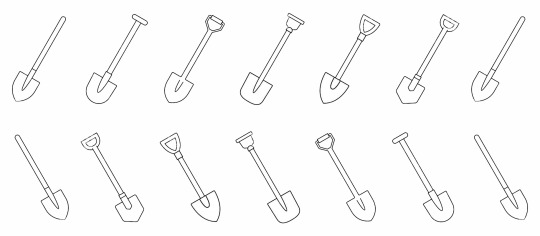
[…]
Pale.
Pale.
Pale.
Pale.
Pale.
Pale.
Pale.
[…]
Versi tratti da Sacred Emily di Gertrude Stein.
Cannibalizzando un brano de La struttura assente di Umberto Eco:
Un uso indubbiamente inconsueto del codice. Il messaggio appare ambiguo proprio per un eccesso di ridondanza a livello dell’impiego dei significanti; e l’uso della ridondanza è cosi spinto da generare tensione informativa;
il messaggio appare ridondante anche a livello dei significati denotati; nessuna affermazione può essere meno equivocabile, il principio di identità è cosi provocatoriamente ribadito da diventare ambiguo, da ingenerare sospetto (domanda: in ciascuna delle sue apparizioni, il significante ha sempre lo stesso significato?);
scatta una informazione a livello dei lessici definizionali (scientifici e filosofici); la novità del procedimento ci impedisce quasi di riconoscere il significato denotato;
scatta una informazione a livello dei lessici allegorici e mistici: sistemi di attese retoriche in base ai quali “Pale ” connota abitualmente vari significati simbolici, che qui vengono suggeriti ed elusi al tempo stesso;
scatta una informazione a livello dei lessici stilistici e cioè di sistemi di attese stabilitisi quasi come norma in conseguenza di abitudini stilistiche acquisite nel corso di altre letture poetiche (siamo portati ad attenderci usi metaforici del termine “pale”, affermazioni emotive sulla parola "pale", ecc.).
Anche una semplice ispezione di questo tipo ci mostra come informazione e ridondanza si stabiliscono a livelli diversi interagendo tra di loro.
Infine, una mia (libera!) traduzione:
Chiara.
Pallida.
Smorta.
Esangue.
Scialba.
Slavata.
Triste.
G. Stein, da Sacred Emily, 1913. Online QUI.
U. Eco, La struttura assente [1968], Milano, Bompiani, 1980
4 notes
·
View notes
Text
Stiamo assistendo, quindi, alle prove tecniche di una sorta di democratura. Le connessioni con ciò che accade in Polonia e in Ungheria sono esplicite. Proprio per simile impostazione di fatto antieuropea, non fa né caldo né freddo la messa in mora da parte di Bruxelles e gli stessi provvedimenti in corso d’opera – a partire dall’European Media Freedom Act – sono elusi o bellamente infranti. L’iter parlamentare del provvedimento è al suo inizio. La Federazione nazionale della stampa, l’Ordine dei giornalisti e Articolo21 hanno espresso pareri assai negativi. È il momento di rinsaldare il fronte delle opposizioni, che qui ha l’occasione di mostrarsi unito e capace di difendere le stesse iniziative assunte quando governava. Se è vero, però, che la misura sulle intercettazioni è l’antipasto di una cena non certamente di gala, allora è necessario mobilitarsi senza tentennamenti. Una manifestazione nazionale sulla libertà di informazione, come quella che riuscì con successo nell’ottobre del 2009, è un obbligo civile. Allora c’era Berlusconi. Ma il berlusconismo senza il suo creatore è ancora peggio.
https://volerelaluna.it/rimbalzi/2023/06/23/nordio-ovvero-intercettando-godot/
5 notes
·
View notes
Text

COLLAGE ON VIEW
Catalog
At The Elusie Gallery in Easthampton, Massachusetts, USA, 4-30 November 2022. When Michael Sjostedt started the "Catalog" series, he wanted to create evidence of how he consumed imagery and messages that he had a deep, charged history with. He started from instinct, not overthinking the process—like he did when he was "shopping": culling, layering, extracting, and incorporating other materials and techniques that connected with the experience and subject matter—sewing patterns, pencil-drawn grids, tape transfers. The final collection illustrates how he looks out to look in—and look out again. The messy visual narrative is what it felt like to catalog his experience with content focused on buying what you can be. MORE
*****************************
Kolaj Magazine, a full color, print magazine, exists to show how the world of collage is rich, layered, and thick with complexity. By remixing history and culture, collage artists forge new thinking. To understand collage is to reshape one's thinking of art history and redefine the canon of visual culture that informs the present.
SUBSCRIBE | CURRENT ISSUE | GET A COPY
SIGN UP TO GET EMAILS
#collage#collage art#collage artist#art#artist#art history#art project#vintage art#art show#art education#book art#artistic#contemporary art#artwork#modern art#fine art#digital art#artist books#contemporary artist#artist portfolio#artist book#artist profile#artist collective#photocollage#collage illustration#digital collage#paper collage#cutout#cut paper#cut and paste
9 notes
·
View notes
Note
I’m thinking about nonfiction a lot rn (a lot of the books I have I acquired from a friend purging his library and outside of their outstanding queer collection it’s all rather random).
Do you have any great nonfiction you’ve read? I think the best one I’ve read so far has been King Leopold’s Ghost but I know there’s so much more out there
wow, thanks for asking me!
unfortunately, i've also just been getting into nonfiction recently, so i can only tell you what i've heard and some of the stuff i've read myself.
if you're into queer history and narratives, i'd recommend any of leslie feinberg's works, especially stone butch blues and transgender warriors, both of which offer great insight on the history and experiences of queer people in america. i also read a memoir called boy erased by gerard conley, which is an intense but insightful look at conversion therapy.
was it you who i recommend ghostland to the other day? i think it was, but i'll repeat it here in case i'm wrong.
the holy barbarians is an examination of the beatnik scene on venice beach in 50's, told by someone who was actually part of it. it's an examination of the ideologies and stories of the people involved. there's a lot of nostalgia there, so it should be read with a critical eye, but if you've got any interest in that sort of thing, it's a good one to read.
the immortality key by brian muraresku is an anthropological look at the use of psychedelic drugs in religious rituals, which uses evidence of that use to draw the origins of the modern christian sacrament back to the mysteries of elusis. it's just his argument for the idea, not actual archaeological fact, but there's a lot to be learned from it and makes some compelling points.
those are all just ones i've read (or have imminent plans to read), and i'd suggest looking up the trigger warnings if you think you'll need them, cause some of the material can be pretty intense. hope there's something here you're interested in :)
4 notes
·
View notes
Text
#The Elusive Samurai Episode 9#the elusive samurai#nigewaka#tokiyuki hojo#suwa yorishige#hojo tokiyuki#nige jouzu no wakagimi#the elusive samurai spoilers
0 notes
Text
The greatest astronomical discoveries of the past 25 years | Space
0 notes
Text
Tears of the Kingdom Completion
I beat the game yesterday (screaming and squealing and flabbergasted and generally having a GREAT TIME) so I'm documenting my stats :)
Game began: May 18th, 2023
End reached: Jan. 13th, 2024
Hours played: 190h or so
* means 'completed'
Map
Completion: 65,81% (that's higher than I ever got in BOTW I think lol)
Shrines: 132
Light roots: 120*
Wells: 42/58
Hyrule Compedium
Animals: 74/92 (mostly little birdies, insects and fishes)
Monsters: 107/110 (I forgot to take a picture of Secret Stone Ganondorf 💀😭 I need to play the ending again soon anyways, too many feels for one go only)
Materials: 126/126* (I am VERY proud of this 😇)
Weapons: 143/175 (mostly ✨️ weapons)
Treasures: 6/6* (still counts okay??)
Collectibles
Batteries: 13 blue/24
Sages' Will: 14/20
Koroks: 213
Elusis: 60 remaining (+ 41 in inventory)
Stone plans: 11
Yiga plans: 15
Old maps: 21
Horse equipments: 5 full sets (travel, martial, royal, apparat, monster)
Great monsters
Lithoroks: 70 remaining (😮 and I did beat almost all the ones I came across)
Hinoxs: 48 remaining
Moldarquors: 1 remaining
Golemax: 10 remaining
Griocks: 7 remaining (proud of myself for slaying 2 Griocks Kings already!!)
Gigatraciens: 28 remaining
Recipes
161/228
Missing, in #: 7, 21-23, 28, 35, 38, 42, 44, 53, 55-57, 59, 63, 64, 73, 80, 83-87, 89, 93, 110, 117, 138, 141, 142, 144, 149, 157-164, 168, 171, 172, 174, 176, 178, 184, 185, 187, 188, 191, 197, 201, 203-214, 221, 222
Missing, in words (my guess): lots of grilled stuff, simple risotto, salted shrooms, frozen meat, dorade meunière, tomates au fromage
Adventure journal
Main quests: 21/23* (assuming "Slay Ganondorf" and "Searching Zelda" are never counted as finished, which hurts my completionist heart but that's another story)
Secondary quests: 58/60 (Hyrule Compedium logged and ??? remaining)
Shrine quests: 26/31
Missions: 109/139 (6 logged, 24 remaining)
#the legend of zelda#zelda totk#zelda totk spoilers#totk spoilers#my stats#now i need to watch all of the cutscenes#this is my petition for an in-game cutscene viewing tool#pls i'm begging you
0 notes
Text
LTB Worldbuilding Wednesdays: The Union of Saván
A weekly series in which two of my BG3 Tavs describe the original homebrew 5e world they live in.

Cannor’s Guide
“People and places are complicated. Nowhere is that more true than Saván. Once an oppressive slave power, now a fumbling yet formidable outpost of freedom, and forever in the shadow of more prosperous Narán. Comparisons are unfair, but in my experience clichés exist for a reason, and extremes tell the story here. Wedged between the river and the sea, Saván has been a continental crossroads for millennia. The Hydra River floods regularly, but figurative floods also abound: slavery and freedom, hate and love, loss and salvation. Saván is flat and exposed, with only the river’s swiftly cold northern and meandering warm southern branches meeting in the fetid Sadhoura swamp to mark the eastern frontier.”
“In the north, both snakes and winds hiss through the ruined plantations and tall grass of the ‘seething fields’ where slaves toiled and rebelled. Formerly a cruel flesh mart, the city of Scalaba now dispenses impersonally pitiless justice against all wrongs—some say to the highest bidder, but primarily against Saván’s original sin: slavery. After that hideous institution’s bloody end, dependent martial organizations have spent the past fifty years devising new ways of life. The four frontier Curraisae fortresses simply flipped the script; instead of keeping slaves in, they’re now garrisoned with freedmen who fight to keep the Ovalansi horselords out. The elite, multicultural Arbascan Navy on their volcanic island base of Scandena, whose ships once transported slaves, now eradicates piracy from the Savansi coast and Narrow Sound.”
“The third most significant Savansi faction is the Schismatic Order of Sanduzca, or ‘Splitters’ (but don’t call them that). This rigid sect thrives among the urban masses, and they’re not fond of anyone remotely connected with slaver bloodlines. They’re dour, serious, and absolutely relentless; I myself got caught in a Splitter dragnet and spent a year in their dungeons because I fell for a slaver-descended belly dancer in Secabeira. The dry Sanduzcan countryside is full of ominous saints and hidden saviors from the Ausertian badlands and jungles at the bottom of the world, or the warm steppe and great lakes of the East, or even from wondrous Zeyira beyond the western sands. The Schismatics recruit them all with hyper-passionate, almost inquisitorial fervor. Saván’s a deeply spiritual place, with a faith more vengefully righteous than peacefully liberating, but can you blame them? Slavery isn’t subtle, and divine memory is forever.”
“Other Floodlanders choose more corporeal salvations. This is also a sensual, sensory place; the river and sky are bluer, the soil richer, the fields fuller—and all blend together in the humid heat. Savansca remains a symbol of refined passion, but not necessarily love. Former bed-slaves are now entrepreneurs, and the capital’s general opulence often drives the ruling classes to their estates in Fortaleva, like the Matriarch’s Court with its resplendent dragon banners. Despite raucous festivals and recent freedom, an endless longing pervades Savansi minds and souls, as if they’re still missing something unrecoverable. Don’t confuse Floodlander judgment for justice, pleasure for love, or sanctuary for shelter. Be judged here. Be saved here. And sadly—even now, in some ways—be sold here.”
Ruy’s Reckoning
“The Union of Saván is an oligarchic-democratic alliance of the three southern Sister Cities (Sanduzca, Savansca, Scalaba) and the territories they jointly administer: strategic Scandena (The Sentinel) and semi-wild Sadhoura (The Wetlands). Regional culture began in the Floodlands when native Anduz and Uve peoples mixed with western Elusi colonists to form the Damashi civilization. They expanded as far as the open sea in the north and the Great Curve range in the east, but conquering Aurigans destroyed everything in what they called Arantia and Avantia, rebuilding only the Six Sister Cities and imposing a patriarchal slave state for centuries. Post-downfall, local oligarchs controlled Saván until a violent revolution fifty years ago ended slavery and their rule. Saván today is more democratic than Narán, but also more kleptocratic—as the civilian assembly struggles to govern, the rich consolidate their wealth, and Schismatic fundamentalists preach uncompromising dualism.”
Main settlements: Sanduzca (“The Schism” in Auransi, population 126,791; large city), Savansca (“The Sanctuary” in Auransi, population 112,075; large city), Scalaba (“The Scales” in Auransi, population 76,112, large city), Arbasca (The Base; small city), Livrea (Freeside; town), Convisceia (Conviction, town), Secabeira (The Dry Edge, town). Fortresses: Forquimeira (The Summit), Cuernacaba (Cape Horn), Asprecas (The Fangs), Chaveia (The Key), Norecurrais (North Corral), Maoicurrais (Main Corral), Meiacurrais (Middle Corral), Fortaleva (Overworld), Sulecurrais (South Corral), Forquonsca (The Forks). Rulers: The Conselhordém (Council of Order; Sanduzca), The Livirtasémbleia (Assembly of Liberty; Savansca), The Honoradiréito (Court of Honor; Scalaba). Languages: Auransi (Naransi and Savansi dialects), Ovalansi. Economy: Oligarchic, expansionist mercantile, producing alum, cotton, linens, paper, steel, sugar, textiles, and wheat; trading (with anyone) for coal, copper, iron, silks, spices, and wine.
All text and imagery taken from "The Nua Gazetteer, Volume 1" by Keir DuBois (2022).
#ltb worldbuilding wednesdays#worldbuilding#5e worldbuilding#ttrpg maps#fantasy maps#fantasy worldbuilding#nua six sisters
0 notes
Text

Saturn, Oil Pastel on Black Chalk Paper
(NASA live)
* * * *
Problem. Mystery
“Scientific rationalism consists largely of problem solving, an approach that does lead to systematic advance: after a problem has been solved, it can be laid aside and scientists can move on to tackle the next. But the humanities do not function in this way, because the problems they confront, such as mortality, grief, evil, or the nature of happiness, are not capable of a once-and-for-all solution. It can take a lifetime’s engagement with a poem before it reveals its full depth.
This type of contemplation may function differently from ratiocination, but it is not for that reason irrational; it is like the "thinking” Heidegger prescribed: repetitive, incremental, and receptive. The French philosopher Gabriel Marcel (1889-1973) distinguished between a problem, “something met which bars my passage” and “is before me in its entirety,” and a mystery, “something in which I find myself caught up, and whose essence is not before me in its entirety.”
We have to remove a problem before we can proceed, but we are compelled to participate in a mystery – rather as the Greeks flung themselves into the rites of Elusis and grappled with their mortality. “A mystery is something in which I am myself involved,” Marcel continued, “and it can therefore only be thought of as a sphere where the distinction between what is in me and what is before me loses its meaning and its essential validity.” It is always possible– and perhaps a modern temptation– to turn a mystery into a problem and try to solve it by applying the appropriate technique.
It is significant that today a detective story based on such problem solving is popularly known as a “mystery.” But for Marcel this is a “fundamentally vicious proceeding” that could be symptomatic of a “corruption of the intelligence.”
–“The Case For God” by Karen Armstrong
via “Alive on all Channels”
2 notes
·
View notes
Text
feeliing elusiive
0 notes